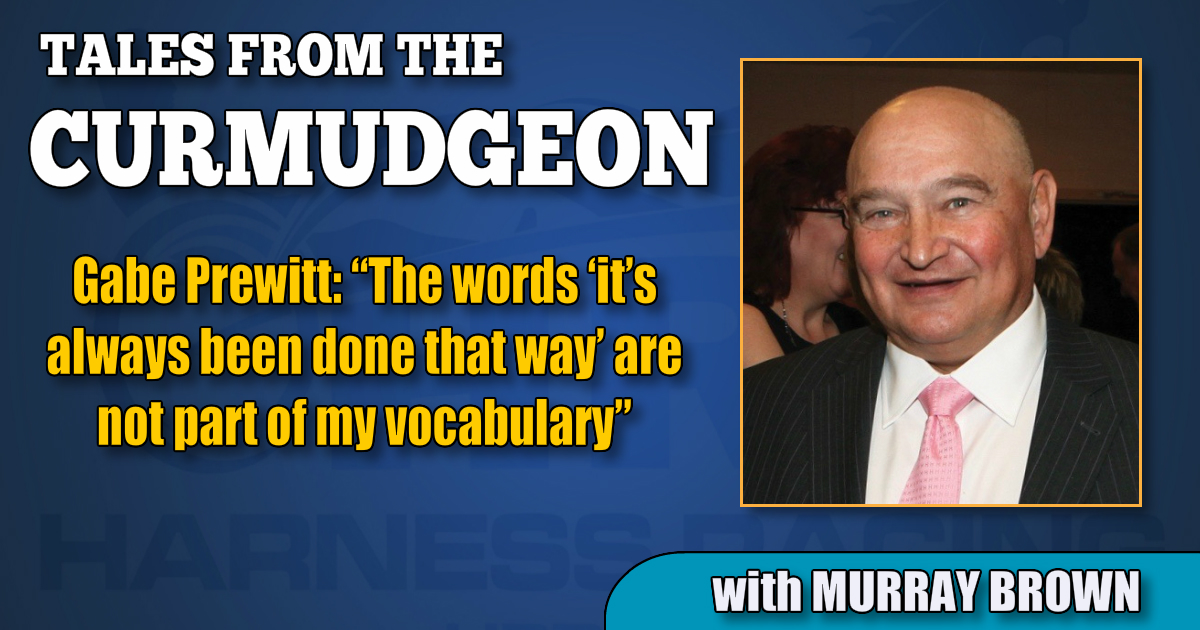Gabe Prewitt: “The words ‘it’s always been done that way’ are not part of my vocabulary”
by Murray Brown
Is there a single person with a greater involvement in harness racing than Gabe Prewitt?
None that I’ve met.
He has, to a large degree, been responsible for the renaissance of racing both at Pompano Park and, together with Joe Morris, and their rendition team, at Scioto Downs.
He is a small breeder and has been moderately successful in both breeding and racing a few horses.
He is among the foremost race callers in North America, regularly doing the duties at Red Mile and Pompano Park, but also subbing at several other racetracks.
He is an ace interviewer and a most astute handicapper.
He was the head of the Kentucky Horseman’s Association for 10 years.
He stepped into a role totally foreign to him as a pedigree reader at Harrisburg and did it as though he has been doing it all his life.
In August, he was named the director of racing for Caesars Entertainment-Racing, the parent company of Pompano, Scioto, Harrah’s Hoosier Park and Harrah’s Philadelphia (full story here).
He comes from a background devoid of horse racing and admits that he knew nothing about standardbreds until he moved into an apartment right across the road from Red Mile.
Previous to that, he had been somewhat a fan of the runners, attending the spring and fall meets at Keeneland while a student at the University of Kentucky.
A friend of his one night suggested they cross the road to see the trotters.
To that point he barely knew that harness racing existed. “What are they?” he asked his friend. “They are racehorses,” his friend replied. “But instead of being ridden by jockeys, they are driven in sulkies by drivers. A major difference is that they don’t gallop, they trot or pace — which are gaits which their breeding generally determines how they will race.” So, they went across the road and Gabe discovered that he was having a terrific time. This was fun!
He started going regularly and like a sponge his head began filling with knowledge of this new found sport. Maybe more important, he was finding that he could make money while enjoying himself. What started as fun, turned to work. He became an astute handicapper. He would watch race reruns constantly. He would pick up every bit of information that he could possibly garner. He became consumed with the small things that often made the difference between winning and losing. He has always been a numbers person and when handicapping horse races, he would try to make the numbers work in his favor.
Upon his graduation from the University of Kentucky, he ventured into a few areas other than harness racing among them as a loan officer at a bank and a job with the Kroger grocery chain.
Throughout this period, he had become a devoted fan of harness racing with his interest growing as time evolved.
His first opportunity at a job in the sport was when he moonlighted as a teller at the Red Mile.
From there he progressed to the money room.
One evening, the track announcer, Kevin Mack, who was also the race secretary, became indisposed and asked Gabe if he would try subbing in for him.
From there, he eventually became the full-time announcer at Red Mile except during the Grand Circuit meet where his idol, and just about everybody’s dear friend, Sam McKee, took over the microphone. While the greatest track announcer ever (mine and others’ opinions) was calling the races, Gabe did the on-track interviews. There he met and became acquainted with just about all the great names in the sport.
After a few years at Red Mile, he was asked if he was interested in becoming the track announcer at Buffalo Raceway for their winter meet. He decided to give it a try.
At the beginning, he found the adjustment to the winter climate of Buffalo somewhat difficult compared to what he was used to, but he persevered and worked the microphone in Hamburg, NY for two racing seasons.
Throughout the time away, he was never more than a phone call away from his friend and mentor Sam McKee who was always available to give him advice and support.
Gabe, you were the horseman’s representative with the Kentucky Horseman’s Association from April of 2010 to this Summer. How did this come about?
“I was looking for a job in the industry and this position became available. I was very fortunate to secure it. At the time I was selling ads for the Thoroughbred Times. I realized the precarious nature of print journalism and decided I needed something more secure. The people there, especially its president Bob Stewart, could not have not been nicer and more accommodating. I was in charge of day to day operations and was involved with negotiations with the racetracks. I cannot emphasize enough the tolerance and help that everybody involved gave to me.”
What brought you to Pompano? What have you done there?
“I think the number one thing, as it has hopefully been with every track with which I have been associated, has been not being satisfied with the status quo. The words ‘it’s always been done that way’ are not part of my vocabulary. You need to try new things. They won’t always be successful, but you need to try. Each year we’ve improved the product at Pompano. Joe Morris, my boss at Scioto, has been a great help as a mentor and friend. He understands racing. He understands bettors. So many tracks today are led by well-intentioned people who have never been in the fray of battle as bettors. In my opinion it really helps to be or have been a gambler yourself in order to better understand what your customers are looking for and what pleases or displeases them.
“In retrospect, I regret that we closed the meet at Pompano at least two weeks too early this year. We would have had the market all to ourselves. Goodness only knows how well we might have wagered during that period.”
What are the reasons for the incredibly successful meet you had at Scioto this year?
“The first reason was probably that we were one of the first tracks out of the box. Nobody else was racing, so we had the action all to ourselves. I thought our racing was ultra-competitive. Some of it might have been due to a dearth of racing previously. People needed money. They hadn’t been racing for a long period of time when usually money had been coming in. The expenses were virtually the same. The purse money was needed by everybody. This led to more competitive racing.
“We had a two-week audience pretty much to ourselves. Once other tracks started racing, we had built up our fan base considerably and they continued to wager with us. I also believe that a good part of our success was because of judicious management by our entire team. We also expanded the betting menu. Bettors love carry-over wagers with smaller takeouts. Perhaps more than anything, we tried to control our post times so that there was little — or better than that — no conflicts with other tracks. I believe that a combination of all these factors were involved with making the meet as successful as it was.”
Gabe, you read pedigrees at sales. You started at the top, at Harrisburg and most recently you did a great job as a last-minute sub at the recent Ohio Select Sale. What brought you to it?
“Well, to a degree, you did. You highly recommended me to Pete Spears. Sam McKee had of course, passed away and they needed a replacement. Nobody replaces someone like Sam McKee. I was privileged to sit in his seat and to go third in line behind Ed Teefey and Hollywood Heyden. I would be lying if I said I wasn’t nervous, if not downright scared. But it’s like most things, especially things that you love doing — the more you do it, the more adept at it you become. I hope that as long as they will have me, will be as long as I read pedigrees at Harrisburg. Of course, this year the sale will be in Timonium Maryland.”
Let’s talk about some of the people you have been associated with.
Joey Costa – “A great guy who sometimes does not receive the credit he should get. Joe is somewhat of a man behind the scenes. Before he came on the scene The Red Mile had no political juice in the Commonwealth of Kentucky. We were basically an unknown with little political power. Joe has changed that a great deal. He knows the powers behind the scenes and makes it a point that they know about The Red Mile and its importance. Despite us sometimes sitting at different sides of the table, he is also a very good friend. Joe has a philosophic side to his nature. Many of our conversations have little or nothing to do with horses or racing.”
Sam McKee – “In two words simply THE BEST. To have known Sam was to have loved him. He was the very best ever at race calling, reading pedigrees, as an analyst, as a horseman and perhaps most importantly as a great friend to anybody and everybody who was privileged enough to have known him. Any success I’ve had to some degree comes through Sam.”
Joe Morris – “A terrific and talented man. Among racetrack management, he is about the best friend a horseman could possibly hope to have. I’ve been privileged to have him as my boss at the Thoroughbred Times and Scioto Downs. It would be extremely difficult to find a better one.”
Dave Brower – “A great friend who I have known and also worked with for many years. He is one terrific handicapper and analyst as well as being as good as we have as a TV host.”
Ed Teffey – “I first met Ed when reading pedigrees at Harrisburg. Ed has been there a long time and does a superb job of it. He was kind enough to recommend me for stints at the Indiana and Ohio Select sales when he was unable to be there.”
Bob Heyden – “If there is a kinder, less selfish person in this business than Holly, I’ve yet to meet him. His knowledge is monumental and he is never reluctant to share or extend a helping hand.”
Nick Salvi – “America’s guest. He’s here, he’s there, he’s everywhere. There’s nobody in the sport who doesn’t have a good word to say about Nicky. But behind all that bonhomie exists a strong and versatile work ethic. There is very little related to harness racing that Nick hasn’t done and in some areas excelled.”
What’s the future hold for Gabe Prewitt?
“If I were to describe myself in one word, that word would be competitor. I am never satisfied with the status quo. I am always looking to improve and for higher mountains to climb. I hope that I am able to continue to remain with that mindset and work ethic.”
Have a question or comment for The Curmudgeon?
Reach him by email at: hofmurray@aol.com.

















